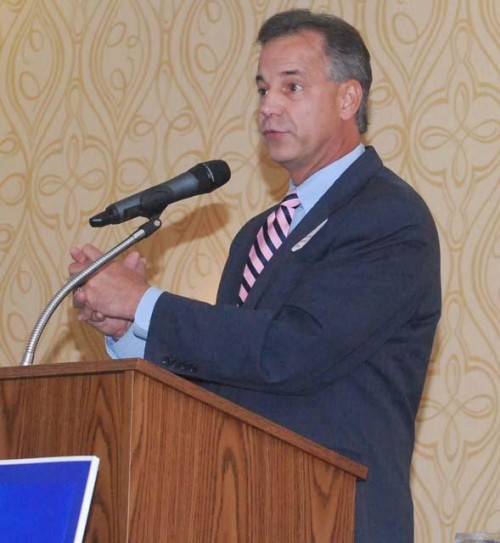Tuesday, April 26
April 26, 2011Louisiana Art and Science Museum (Baton Rouge)
April 28, 2011Louisiana Department of Natural Resources Secretary Scott Angelle said he would work to lessen the impact of a post-Deepwater Horizon federal change in policy regarding an oil company’s environmental assessment process during a visit to Houma last week.
After the Deepwater Horizon incident a year ago, the federal government mandated Site-Specific Environmental Assessment (SEA) for new exploration drilling permits as part of the National Environmental Policy Act and regulated by the Bureau of Ocean Energy Management, Regulation and Enforcement.
Prior to the Macondo well disaster, environmental assessments, which examine an area’s ecosystem to from the “amoeba to the gorilla,” according to Angelle, fell under the Environmental Impact Statement, a higher-level process that wasn’t specific to each individual well.
Angelle said he is concerned too much time will lapse as BOEMRE, with its oft-maligned personnel, goes through the process of approving the SEAs, and, in turn, the south Louisiana rig-service industry would anticipate work.
“You’ve got a federal agency that is understaffed to take care what it needs to take care of it and it’s being told, ‘You have to do something that you never did before,'” Angelle said. “By the way, all of us are waiting, hanging in the balance.”
Fifty-seven rigs operated by 13 companies are exempt from completing the SEA. The exempted companies had their deepwater operations suspended after the Department of the Interior enacted its Gulf of Mexico drilling moratorium last May.
Shell Offshore Inc., when it was granted the first permit for new well exploration at the end of March, is the only company to satisfy the now-individualized SEA.
Angelle said the process took five months and he is “trying to find a sweet spot that we can get private consultants,” to help in expediting the process.
“The next one might take three months, the next one might take two months and maybe we can get it to a 30-day turnaround,” he said. “In the meantime, once those 57 are permitted and done, unless we can fix the ones that require the environmental assessment, I am concerned that we’re going to have a peak and then a valley and another peak.”
The Gulf Permit Index released last week data that claims deepwater permits have been granted at a rate of 1.3 per month since February, 78 percent less than historical averages. GPI said one deepwater rig produces 700 Louisiana jobs.
“As we reflect on the events that transpired last April, we urge BOEMRE to allow safe drilling to continue at reasonable rates,” said Michael Hecht, president and CEO of Greater New Orleans, Inc., one of the entities involved compiling the data. “It’s paramount to our national security, our regional economy, and the livelihoods of families along the Gulf Coast.”
The DNR secretary made his comments during a 30-plus minute presentation to South Central Industrial Association members at the Courtyard by Marriott.
Angelle also expressed urgency in the need to stabilize oil prices. Although the unemployment numbers in south Louisiana may be lower when oil is trading for $100-plus per barrel, Angelle said the last six national recessions were caused, at least in part, by a peak in energy prices.
“Each one of those recessions we’ve had in this country have been preceded by a spike in energy prices,” he said. “As goes the availability of cheap energy, so goes the American economy. If you don’t think that’s a natural reflection of what the facts are, remember in July 2008, oil was trading $147 a barrel.
“I think the alarm buzzer has gone off,” Angelle said. “If we don’t figure this thing out pretty quick in America, even here with $100 oil, I’m not sure we’re going to enjoy sustainable recovery.”
Ten days before the Department of the Interior imposed a six-month drilling moratorium on Gulf of Mexico activity, Angelle began his six-month stint as Gov. Bobby Jindal’s appointment for lieutenant governor.
“If you’re not from here, that’s a difficult thing to rationalize,” Angelle said. “I think, quite frankly, that the American government thought they were doing us a favor when they imposed the moratorium on us.
“I think the BP oil spill made us sad, but the moratorium made us mad that our own government would make us their victims.”
According to Port Fourchon Executive Director Chett Chiasson, the secretary’s federal testimonies against the moratorium and strategic planning meetings with industry stakeholders deserve credit for the moratorium’s less-than-drastic impact.
“I think the work he’s done and leadership he’s shown though this time is why the industry has been able to make these strides,” he said.
Ted Falgout, a SCIA board member who received the Governor’s Conservationist of the Year Award last month on the association’s nomination, agreed with Chiasson’s point. “No one single person in this country, in this country, has played a greater role in getting the energy industry and Louisianians back to work than Scott Angelle,” Falgout said.
State Department of Natural Resources Secretary Scott Angelle speaks to members of the South Central Industrial Association. An advocate for drilling, Angelle spoke at last week’s SCIA meeting in Houma about the new issues facing the oil and gas industry, including a prolonged environmental review process. ERIC BESSON









